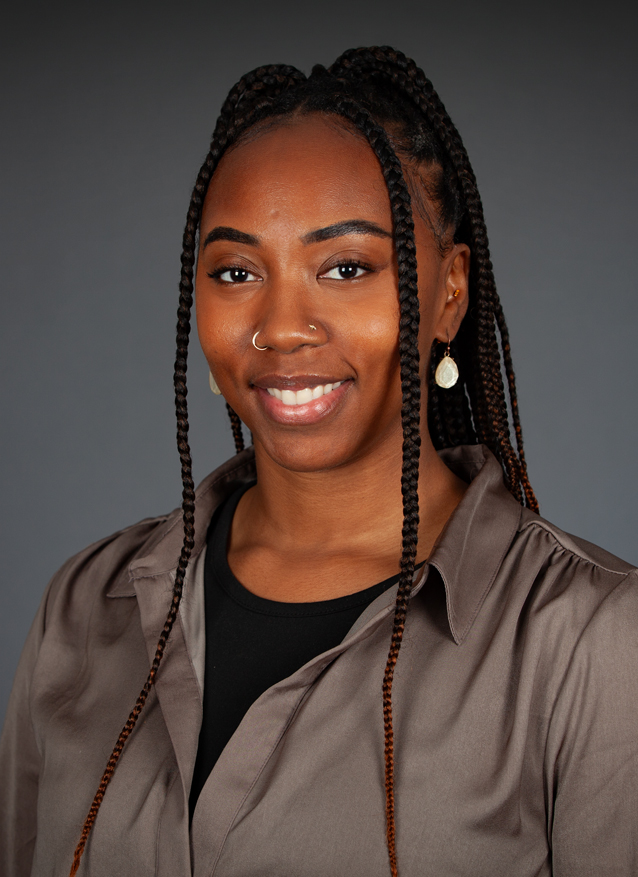At the start of the 2023 academic year, we welcomed Shamecca Perkins (Mecca) to the Foundation as our new Graduate Fellow. A former student advisor pursuing her doctoral degree in Educational Psychology at The University of Texas at Austin, Mecca brought extensive experience and a strong dedication to education accessibility and equity.
As her two-year tenure as our Graduate Fellow comes to a close, we asked Mecca to reflect on her experience and share what’s next in her professional journey.
What drew you to Trellis Foundation’s Graduate Fellowship?
As a non-native Texan and someone primarily here to complete my Ph.D., I had never heard of Trellis Foundation. It was an ordinary day, scrolling through LinkedIn, when I stumbled upon a post that a friend from undergrad had shared that had Round Rock, TX, as the location. I clicked purely out of curiosity. I wasn’t looking for a new opportunity, nor was I particularly interested in philanthropy at the time. Yet, moments like this one, stumbling upon a job post, remind me of how singular events or instances can change the trajectory of your life. After reading the description, I applied. Here I am two years later.
What has been the most rewarding part of your fellowship?
My experience with Trellis Foundation has been one of the most transformational experiences of my life. The Foundation has given me the chance to meld my passion for research and asking the right questions with real-world change and coalition building. I have had opportunities to brainstorm and have meaningful conversations with people and organizations that are doing the “work” each day. Seeing these conversations manifest as new ideas and projects to improve student success has been the most rewarding part of my fellowship.
As you approach the finish line, what are your top Ph.D. survival strategies?
Keep a notebook with all your ideas, thoughts, research questions, and connections between them. My advisor first gave me this advice when I started the program, but I didn’t take this advice seriously until I started my dissertation. This one suggestion has helped me organize my thoughts and connect ideas across my academic research and my work with Trellis Foundation.
Read an article or manuscript every day (or at least every few days) and keep a detailed log with the key findings with tags for each topic. I have been using Airtable to log my articles, but Excel or any other spreadsheet software works equally well.
Lastly, stay grounded in why you chose to pursue a Ph.D. and what you see as its utility, and stay focused on your own trajectory. It can be difficult not to look at others’ journeys and compare yourself to them. I experienced a sense of shame and guilt for not finishing with my cohort. However, I had to recognize that no one’s journey looks the same, nor should it.
I have made the most of my degree because it was important for me to gain experience in addition to the knowledge and skills of being a researcher, all while also working full-time to support myself. Several factors have contributed to a longer timeline than anticipated, but I have remained focused on completing my Ph.D. and surrounded myself with people who provide honest encouragement. I must give a special thanks to my advisor, Dr. Marie-Anne Suizzo, for staying supportive and patient with me.
What advice would you give to our new Graduate Fellow?
To the next Trellis Foundation Graduate Fellow, Marianna, and to future graduate fellows, my advice is to immerse yourself fully in this team of passionate and dedicated people. It is easy to complete your responsibilities and sign off at the end of your term, but the value of this fellowship lies in the connectedness of the team and their ability to leverage each member’s expertise, individual strengths, and unique passions to achieve a common goal: making education in Texas equitable for all. Additionally, be open to growth, meeting new people, and entering new spaces. Find how your passions and strengths add to the team.
What is the next step on your career path?
As I end my fellowship, I will be working with AISD, utilizing my skills in quantitative methods for project evaluation. I am also assisting with assessment and evaluation at UT-Austin. Although these roles differ from my work at the Foundation, I can leverage my experience with reviewing grants to help design better processes for evaluating the success of projects and ask better questions. In the long term, my fellowship has also helped me understand the full context of education in our state and ponder what a better and equitable future for education looks like at all stages of learning.
About the Author

Shamecca Perkins is a first-generation college graduate and a fifth-year doctoral student in Educational Psychology at The University of Texas at Austin. She is a Graduate Fellow at the Trellis Foundation and a Graduate Research Assistant at the Meadows Center for Preventing Educational Risk. Before moving to Texas, she served as a college adviser in rural Virginia with the Virginia College Advising Corps. Shamecca graduated from the University of Virginia with a B.A. in Psychology and Spanish. She also has an M.Ed. in Quantitative Methods from the University of Texas at Austin and is anticipating completing her dissertation and doctoral degree in May 2025.